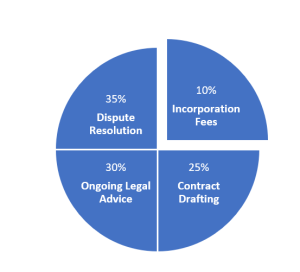Latest Facts and News
- According to recent data, people spend an average of $13,300 on average legal expense for small businesses annually.
- Due to new regulations and employment issues, the COVID-19 pandemic has increased the average legal expense for small businesses.
- Legal technology tools are becoming increasingly popular among small businesses to reduce legal costs.
At the inception, every small business owner faces their first challenge i.e. legal costs. These expenses can cripple a company and take up a huge chunk of capital which can be used for operations and growth.
You might wonder, what’s the big deal, or what the average legal expense for small business could be that would make it a significant issue? The answer lies in knowing and anticipating costs you might incur on services like filing contracts, taxes, MOUs, compliance paperwork, and more.
Once you know the storm’s size, it becomes easier to face it. So, let’s explore the factors that influence legal fees and how you can make your business financially sound without overstretching your budget.
Breakdown of Average Legal Expenses for Small Businesses
A great business idea can often take a back seat once you get into the nitty-gritty of the average legal expense for small businesses. Long-term profits and short-term sustainability seem difficult when you start calculating how much an accountant, CPA and legal fees for start-ups would add to your budget.
Don’t lose hope; we’re here to explain it and point you in the right direction. We will begin by checking out the percentage allocation of a typical small business legal cost:

The key areas that require legal services include the following:
Business Formation and Registration Costs
Limited Liability Companies (LLCs) and Corporations are the most common structures for small businesses. The added costs include state filing fees, attorney fees for drafting formation documents, and other incidental expenses. On average, business formation and registration costs range from $500 to $2,000, depending on your location, size, and type of business.
Here’s a comparison of formation costs for business structures in select states:
| State | LLC Formation Cost | Corporation Formation Cost |
| California | $70 filing fee | $100 filing fee |
| Delaware | $90 filing fee | $89 filing fee |
| Texas | $300 filing fee | $300 filing fee |
| Florida | $125 filing fee | $70 filing fee |
These numbers depict basic state fees, which can increase. A professional would help you bring down the average legal expense for small businesses and startups.
Contract Drafting and Review Fees
Any business deal would include contracts. The average legal expense for small businesses for drafting and reviewing contracts varies based on complexity. Well-drafted contracts clarify issues between clients and suppliers and protect you from litigation. It would help you talk to a legal expert about this step.
Common Types of Business Contracts and Average Costs:
- Client Agreements: $300–$800
- Seller Contracts: $400–$900
- Employment Agreements: $500–$1,000
- Partnership Deeds: $1,000–$2,500
- Non-Disclosure Agreements (NDAs): $200–$500
Intellectual Property Protection
Your intellectual property(IP), including trademarks, copyrights, and patents, will protect your brand, business, and ideas. An attorney can ensure security through strictly worded contracts to protect your work from theft.
Once you are in the middle of growth, you will realize that safeguarding these assets isn’t an option but a necessity. The average legal expense for small businesses is an investment that will determine the smooth functioning of your business.
Steps to Protect Intellectual Property and Associated Costs:
- Do IP analysis: Identify assets to protect (cost varies based on consultation).
- Register for Brand’s Trademark: Certify with the United States Patent and Trademark Office(USPTO). (Fees start at $250–$350 per class).
- Get Copyright: Submit creative works to the U.S. Copyright Office (fees: $35–$85).
- Apply for a Patent: File with the USPTO; expect costs of $5,000+ for attorney-prepared applications.
- Monitor and Enforce Rights: Set aside money to address infringements regularly.
Factors Affecting Legal Expenses for Small Businesses
If you’ve read this far, you might know that the average legal expense for small businesses isn’t the same across the board. Several factors influence how much a business spends on legal services. Here’s a breakdown of the key points:
- Industry Type:
- Due to compliance requirements, average legal costs for healthcare startups or similar highly regulated industries, like finance, often face higher legal fees.
- Example: A fintech startup may need regular compliance audits, resulting in high legal fees.
- Business Size:
- Larger enterprises hire more employees, so they need more agreements, thereby more filing through lawyers.
- Example: A sole proprietorship needs occasional advice on a few matters, while a midsize company may require ongoing legal support.
- Specific Legal Needs:
- Costs rise significantly for services such as intellectual property protection or litigation.
- Example: Filing for a patent costs more than drafting a simple client contract.
- Nature of Contracts:
- Companies frequently negotiating complex deals will face higher contract drafting and review costs.
- Location:
- Legal fees vary by state and city, with urban areas charging higher rates.
- Example: The average legal expense for small businesses in New York would differ significantly from attorney charges in smaller towns.
Regional Cost Comparisons in the U.S.:
| Region | Attorney Rates/Hour | Average Legal Costs/Year | Notes |
| Northeast | $300–$500 | $2,500–$5,000 | Higher rates due to urban density (e.g., NYC). |
| Midwest | $200–$400 | $2,000–$4,000 | Generally more affordable. |
| South | $150–$350 | $1,800–$4,000 | Competitive rates with varying costs by state. |
| West | $250–$450 | $2,300–$5,000 | Includes higher costs in areas like California. |
During your research, dig deep, seek accounting experts, and take out a separate legal budget for all small and midsize companies (SMEs).
Budgeting for Legal Expenses
Budgets can be tiresome but also practical. A well-laid-out string of calculations can save you a lot of time. If you ignore the heading of average legal expense for small businesses from your budget, you’ll find your hard work going down the drain. Allocating resources strategically can help ensure your business remains compliant and protected.
The 1-2% Rule
Set aside 1%- 2% of your yearly profits for legal costs. This wouldn’t break your bank and prepare you for any surprise expenses.
Examples of Legal Budgets Based on Revenue:
A small business with $100,000 annual revenue: $1,000–$2,000
A mid-sized business with $500,000 annual revenue: $5,000–$10,000
A larger business with $1,000,000 annual revenue: $10,000–$20,000
Prioritizing Legal Needs
Don’t get stressed over these numbers; not all legal services demand equal urgency. We’ll help you with a checklist of essential legal services by business stage:
- Startup Stage:
-
- Business formation and registration.
- Initial contract drafting (client/vendor agreements).
- Intellectual property protection.
- Growth Stage:
-
- Employment law (contracts, dispute resolution).
- Ongoing compliance and regulatory advice.
- Specialized contracts (partnership or licensing agreements).
- Mature Stage:
-
- Litigation and dispute resolution preparedness.
- Advanced IP protection (e.g., patent portfolio management).
- Regular audits for compliance and risk management.
One must prioritise the average legal expense for small businesses at every stage of their journey, which might include a robust exit strategy and a business continuity plan.
Strategies for Reducing Legal Costs
We all have expertise in one area or another, so take it from us when we share a few tips on managing the average legal expense for small businesses. Some of them are:
Legal Insurance Options
Legal expense insurance can help reduce unpredictable costs by covering standard legal services. Policies include legal advice, contract review, and defense in legal disputes.
- Average Annual Premiums: $300–$500.
- Benefits: Reduced out-of-pocket expenses.
Top Legal Insurance Providers for Small Businesses:
- Nationwide: Variety of affordable plans with add-ons.
- Hiscox: Customizable policies for small businesses.
- Chubb: Best for medium-sized companies.
Leveraging Legal Technology
Frustrations can pile up, but you have legal tech tools available to simplify routine tasks, saving both time and money. They can assist with:
- Document Creation: Automated templates for contracts, NDAs, and more.
- Contract Management: Centralized storage and tracking of agreements.
- Compliance Monitoring: Alerts for deadlines and regulatory updates.
Comparison of Popular Legal Tech Tools:
| Tool | Features | Cost |
| Clio | Document creation, billing, case management | $39–$125/month |
| Rocket Lawyer | Legal document templates, attorney Q&A | $39.99/month |
| DocuSign | Electronic signatures and contract storage | $10–$40/month |
DIY Legal Tasks
A do-it-yourself approach can reduce the average legal expense for small business owners. You can handle specific legal tasks, reducing the need for costly legal support. However, err on the side of caution to avoid errors that can lead to greater expenses later.
DIY-Friendly Tasks:
- Simple LLC formation (use state-provided resources).
- Trademark filings for small-scale brands.
- Drafting straightforward agreements using templates.
When to DIY vs. Hire a Lawyer
| Factor | When to DIY | When to Hire a Lawyer |
| Complexity | Easy to execute tasks. | Involves complex issues (e.g., litigation). |
| Risk of Mistakes | Minimal consequences. | Significant penalties or losses. |
| Available Resources | Access to reliable guides, templates, or tools. | Trustworthy resources not available. |
| Pro Tip: Follow the 50/30/20 rule for budgeting: allocate 50% to essentials, 30% to discretionary spending, and 20% to savings and legal expenses. This ensures you’re prepared for legal costs while keeping your business balanced. |
When to Invest in Professional Legal Services?
SWAT Advisors can provide value-added legal expertise and handhold you to steer all the average legal expense for small businesses in the following situations:
Complex Business Transactions and Mergers
- Mergers or acquisitions: Legal intricacies to transfer ownership or assets.
- Joint ventures: Drafting agreements that protect your interests.
- Large contracts: Ensures clarity and enforceability.
No Expert Involvement Risk: Loopholes or errors in such transactions can lead to disputes or losses.
Intellectual Property Protection and Patents
- Patents: Filing and defending patents for inventions.
- Trademarks: To secure exclusive rights to your brand.
- Copyrights: Ensures your creative works are safeguarded.
No Expert Involvement Risk: You can lose rights to your product or face infringement claims.
High-Stakes Litigation and Disputes
- Employee disputes: Handle allegations of wrongful termination or discrimination.
- Contract breaches: Resolving conflicts with clients or suppliers.
- Consumer complaints: Manage lawsuits related to product safety or service issues.
No Expert Involvement Risk: Can lose hard-earned goodwill and finances.
Regulatory Compliance in Highly Regulated Industries
- Licensing requirements: Ensure local, state, and federal guidelines.
- Regular audits: Prepare for inspections by regulatory bodies.
- Environmental laws: Complying with sustainability mandates.
No Expert Involvement Risk: Non-compliance can lead to fines, penalties, or shutdowns.
Final Thought
We have covered many key points that contribute to the average legal expense for small businesses. Survival and long-term success depend on assessing future costs. Legal fees vary with differences in size, location, and industry, among other concerns.
However, careful preparation can reduce anxiety and costs. Good contracts, outsourcing wherever necessary, and knowledge of current statutes and regulations help mitigate these expenses.
Seek help from experts like SWAT Advisors for all business needs and cost-effective legal services. Contact us today!
FAQ's
Legal expenses typically range from 0.3% to 0.5% of annual revenue for a small business, though these numbers may vary according to the complexity of legal matters and the company’s growth stage. As an owner, you must keep track of these expenses to know whether they align with overall revenue and the value of legal services to follow legal compliances and manage risks.
Yes, average legal expenses for small businesses are generally tax-deductible if they qualify as necessary to carry on the company. To be tax-deductible, the costs must be directly business-related and connected to income-generating or operational activities. For example, drafting contracts, filing for trademarks or patents, and defending against lawsuits directly related to business operations. Personal legal services are not deductible.
To find affordable legal services, look for experienced lawyers offering fixed-price packages or subscription-based services. SWAT Advisors specializes in providing cost-effective legal solutions for small businesses.
Legal issues include choosing the correct form of entity, such as an LLC or corporation, and registering with the state. The average legal expense for small businesses also includes filing the appropriate Articles of Incorporation or Organization, obtaining an EIN, and establishing by-laws or an operating agreement. To avoid legal problems, a business must comply with state and federal regulations.
For a startup, business attorney expenses to form an LLC or a corporation, cost around $500 to $1500, which includes filing, fees, and registration. The Small Business Administration(SBA) states that a quarter of all businesses begin with less than $5,000 in total costs, and half of the small businesses in the U.S. have start-up costs of less than $25,000.
Starting a business in California requires several legal considerations, such as the market you enter, the licenses and permits you will need, and whether you will hire any employees. Legal fees vary depending on these factors.
| Expense Category | Approx.Range | Notes |
| Attorney Fees | $500–$1,500 | For consultation and business structure advice. |
| State Filing Fees | $70–$800 | Filing fees for LLCs, corporations, or partnerships. |
| Business License | $50–$150 | Required by most California cities or counties. |
| Operating Agreements/Bylaws | $300–$1,000 | Custom drafting or reviewing costs. |
| Trademark Registration | $1,000–$2,000 | It’s optional but recommended for brand protection. |
In a challenging business environment, these are only a part of the legal costs of doing business in California. To avoid extra penalties and legal issues, you must have legal experts with good experience on your side.








